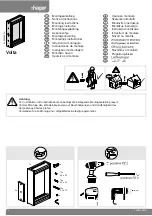
No
Item
Test Method
14
Resistance to
The measured and observed characteristics should
Preheat the capacitor at 120 to 150
℃
for 1 minute.
Soldering Heat
satisfy the specifications in the following table.
Immerse the capacitor in an eutectic solder solution or
Appearance No defects or abnormalities.
Sn-3.0Ag-0.5Cu solder solution at 270±5
℃
for 10±0.5 seconds.
Set at room temperature for 24±2 hours, then measure.
Capacitance Within ±2.5% or ±0.25 pF
Change
(Whichever is larger)
Q
30pFmin.:Q
≧
1400
30pFmax.:Q
≧
800+20C
C:NominalCapacitance
(pF)
I.R.
More than 10,000MΩ
Dielectric
No defects.
Strength
15
Temperature
The measured and observed characteristics should
Fix the capacitor to the supporting jig in the same manner and
Cycle
satisfy the specifications in the following table.
under the same conditions as (10).
Appearance No defects or abnormalities.
Perform the five cycles according to the four heat treatments
shown in the following table.
Capacitance Within ±2.5% or ±0.25pF
Set for 24±2 hours at room temperature, then measure.
Change
(Whichever is larger)
Q
30pFmin. : Q
≧
1400
30pFmax.: Q
≧
800+20C
C:NominalCapacitance
(pF)
I.R.
More than 10,000MΩ
Dielectric
No defects.
Strength
16
Humidity
The measured and observed characteristics should
Set the capacitor at 40±2
℃
and 90 to 95% humidity
Steady State
satisfy the specifications in the following table.
for 500±12 hours.
Appearance No defects or abnormalities.
Remove and set for 24±2 hours at room temperature,
then measure.
Capacitance Within ±5
%
or ±0.5pF
Change
(Whichever is larger)
Q
30pF and over : Q
≧
350
10pF and over, 30pF and below : Q
≧
275+5C/2
C:Nominal Capacitance(pF)
I.R.
More than 1,000MΩ
17
Humidity Load
The measured and observed characteristics should
Apply the rated voltage at 40±2
℃
and 90 to 95% humidity
satisfy the specifications in the following table.
for 500±12 hours.
Appearance No defects or abnormalities.
Remove and set for 24±2 hours at room temprature, then
measure. The charge/discharge current is less than 50mA.
Capacitance Within ±7.5% or ±0.75pF
Change
(Whichever is larger)
Q
30pF and over : Q
≧
200
30pF and below : Q
≧
100+10C/3
I.R.
More than 500MΩ
18
The measured and observed characteristics should
Apply 150% of the rated voltage at the maximun operating
Load
satisfy the specifications in the following table.
temperature±3
℃
for 1000±12 hours.
Appearance No defects or abnormalities.
Set for 24±2 hours at room temperature, then measure.
The charge/discharge current is less than 50mA.
Capacitance Within ±3% or ±0.3pF
Change
(Whichever is larger)
Q
30pF and over : Q
≧
350
10pF and over, 30pF and below : Q
≧
275+5C/2
C:Nominal Capacitance(pF)
I.R.
More than 1,000MΩ
Table A-1
* Nominal values denote the temperature coefficient within a range of 25
℃
to 125
℃
(for 5C)
■
SPECIFICATIONS AND TEST METHODS
Specification
10pF and below : Q
≧
200+10C
C:Nominal Capacitance(pF)
10pF and below : Q
≧
200+10C
High Temperature
Step
Temp.(
C)
Time (min.)
1
Min.
Operating Temp.+0/-3
30±3
2
Room Temp
2 to 3
3
Max.
Operating Temp.+3/-0
30±3
4
Room Temp
2 to 3
Char.
Nominal Values
(ppm/
C) *
Capacitance Change from 25
C (%)
-55
C
-30
C
-10
C
Max.
Min.
Max.
Min.
Max.
Min.
5C
0
30
0.
58
-0.24
0.40
-0.17
0.25
-0.11
JEMCNS-0026
3




































